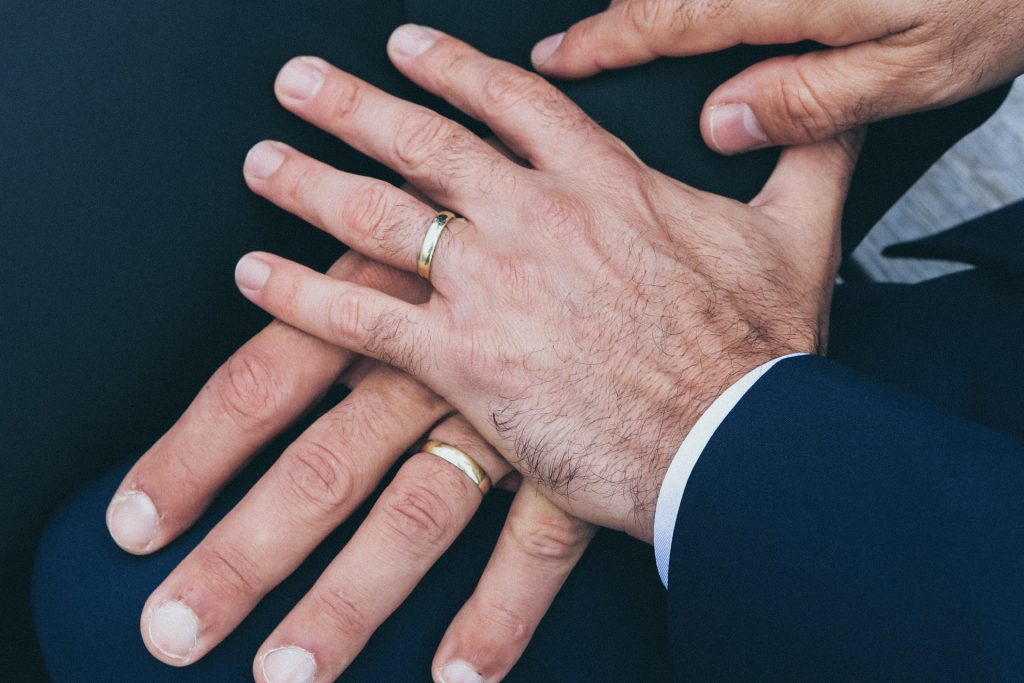How the U.S. Constitution Has Shaped Marriage from Exclusion to Equality
Georgetown Law Professor Paul M. Smith and ACLU of Michigan attorney Jay Kaplan discuss how the U.S. Constitution has been used and amended to regulate the institution of marriage.

Marriage is a deeply intimate decision that a person makes about whom they want to spend their lives with, if anyone. It is also subject to a battery of government rules and regulations.
As the WDET Book Club continues its discussion about the U.S. Constitution and the ways in which it has shaped our nation and our lives, Detroit Today explores what enables the government to interfere in such a personal decision under the U.S. Constitution.
“It is among the most important decisions a person can make, who they want to spend their lives with…(But the founding fathers) wanted it to be a legal institution as well as a personal and religious institution.” — Paul M. Smith, Georgetown Law
Listen: How has the Constitution shaped the institution of marriage in the United States?
Guests
Paul M. Smith is a professor from practice at Georgetown Law and Vice President for Litigation and Strategy at Campaign Legal Center.
Smith has argued many important cases, including Lawrence v. Texas, a landmark gay rights case that was decided by the U.S. Supreme Court, which overturned sodomy laws and protected the rights of gay people to form intimate relationships. Smith explains that before the ruling, LGBTQ+ individuals risked a lot in coming out. “It meant that if you came out publicly as a gay couple, you were coming out as a felon and you could lose your children,” he says.
The fight for LGBTQ+ rights and marriage equality has been met with great resistance for a long time, Smith explains. Many individuals have expressed concern that the institution of marriage could devolve over time. “The idea that giving gay people more rights would be followed by a ‘parade of horribles’ has been with us for a long time,” he says. “I wouldn’t be at all shocked to see in the future someday that there are, in fact, multiple marriages, and people have the opportunity to form whatever kind of family they want and the government has the obligation to protect and support that.”
“Over time, the court began to recognize LGBT people, not in terms of presumed sexual behavior, but as human beings.” — Jay Kaplan, ACLU of Michigan
Jay Kaplan is the staff attorney for the LGBT Project for the ACLU of Michigan.
Kaplan explains that racial and sex discrimination cases in the 1960s and 1970s set the ball rolling for LGBTQ+ discrimination cases going forward. “The court was only looking at gay people in terms of presumed sexual behavior. Then the court evolved and it started deploying equal protection,” he says. “The court said when you pass laws and policies that are motivated by an animus towards a particular group, or the desire to do harm to that particular group, that doesn’t even meet the lowest level of constitutional scrutiny… Over time, the court began to recognize LGBT people, not in terms of presumed sexual behavior, but as human beings.”
“Any time you find a resistance for civil rights from people, you hear this argument about tradition, that we don’t want things to change,” Kaplan says. Over time, however, landmark victories in court have changed the narrative concerning marriage equality and greatly advanced the fight for LGBTQ+ rights.
Web story written by Molly Ryan
Join WDET in reading the Constitution.
This summer, we invite you to get involved as we explore our nation’s founding document.
Sign up to get your free pocket Constitution
Book Club is only possible with your support.
Inclusive, robust conversations like the ones WDET is conducting around the Constitution and Bill of Rights are made possible because of your support. Please make a gift today.
